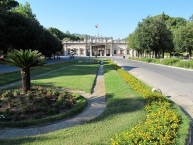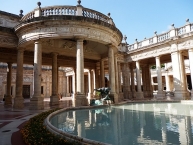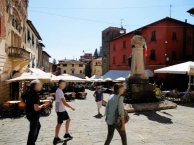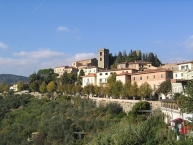Montecatini Terme
Worth visiting
Added on 14 Oct 2022,
last edited by biroto-Redaktion on 14 Oct 2022
Nearby cycle routes and tours
| Route name | Type | Dist. to route |
|---|---|---|
Tour | 0,0 km |
![]()
Please wait - map data are loading
Type of sights
Heritage building(s)
Name and address
Montecatini Terme
IT-51016 Montecatini Terme
GEO-data
Geodetic coordinates
43.88∎∎∎∎ 10.77∎∎∎∎
Elevation
35 m
Communication
Information about copyright | |
|---|---|
Rights owner | |
Rights characteristic / license | by-sa: CREATIVE COMMONS Attribution-ShareAlike |
Link to the description of the license | |
Image taken over from | https://commons.wikimedia.org/wiki/File:Terme_tettuccio_01.JPG |
Image has been uploaded | by biroto-Redaktion on 14 Oct 2022
|
Information about copyright | |
|---|---|
Rights owner | |
Rights characteristic / license | by-sa: CREATIVE COMMONS Attribution-ShareAlike |
Link to the description of the license | |
Image taken over from | https://commons.wikimedia.org/wiki/File:2018-09-14_Terme_Tettuccio_Tempio_Termale_08.jpg |
Image has been uploaded | by biroto-Redaktion on 14 Oct 2022
|
Information about copyright | |
|---|---|
Rights owner | |
Rights characteristic / license | by-sa: CREATIVE COMMONS Attribution-ShareAlike |
Link to the description of the license | |
Image taken over from | |
Image has been uploaded | by biroto-Redaktion on 14 Oct 2022
|
Information about copyright | |
|---|---|
Rights owner | |
Rights characteristic / license | by-sa: CREATIVE COMMONS Attribution-ShareAlike |
Link to the description of the license | |
Image taken over from | https://commons.wikimedia.org/wiki/File:Montecatini_Alto.jpg |
Image has been uploaded | by biroto-Redaktion on 14 Oct 2022
|
Montecatini Terme is a city in the County of Pistoia in Tuscany.
Often defined as garden city due to the presence of imposing thermal and public parks, it is renowned in the world for its thermal waters (springs), that are good for gastrointestinal processes and for cholesterol. Most of its thermal and historical buildings are in Art Nouveau style, some are decorated by Galileo Chini, the most famous Art Nouveau artist in Italy. Montecatini Terme is one of 11 "Great Spa Towns of Europe", a transcontinental UNESCO world heritage site.
Understand
Montecatini Terme is on the eastern edge of the Piana di Lucca in the Val di Nievole and is the largest and most famous spa town in Tuscany. Above the city lies Montecatini Alto, the historic center of the city can also be reached by funicular.
History
Montecatini Alto was the original village: documents state that it's been on top of a hill of 300 m overlooking Valdinievole since the Roman empire, due to its view over the valley. During the Middle Ages, Montecatini Alto was strategically important due to the presence of salts in its land and its position between Florence and Lucca. By the 16th century, the Padule marshlands, which had covered all of Montecatini Terme, had been drained. Later on the thermal springs became the most important business for the area: the Grandduke Leopoldo of Tuscany made this the most important thermal spa in the world.
The Tettuccio Terme was built in the late 18th century by the Grand Duke of Tuscany, Leopold of Habsburg-Lorraine, the son of the Austrian Empress Maria Theresa. The first three spas that were built were the Tettuccio, the Regina and Leopoldine. These spas made Montecatini Terme famous all over Europe, and a favorite place for the rich and the royalty. Famous visitors included Giacomo Puccini, who composed part of La Boheme here, and Giuseppe Verdi, who spent his holidays here for over 29 years and inaugurated the Funicolare.
Geography
Montecatini Terme is in the Valdinievole, the south Valdarno area (the land of Leonardo da Vinci) which is part of the province of Pistoia. The area has been marshy ever since the Roman age, as noted by Tito Livio and Annibale, with thermal springs that are extremely rich in minerals and salts and well known for their healing effects. Romans underlined the "holiness" of these waters.
See
Montecatini Terme
Montecatini Terme is a beautiful town that was built around its mineral water springs. The spring water is considered to help people with trouble with the stomach or liver. Healthy people can enjoy the old time grandeur of the town, stroll in the park or enjoy spa treatments in the various hotels.
The most famous spa in town is the Tettuccio Terme located on the main street of Montecatini Terme - Viale Verdi, next to the park. on the same street you can find the municipality building and the tourist information center.
- ⊙Basilica di Santa Maria Assunta, Piazza del Popolo 31
.
- 6Piazza del Popolo
- 5Teatro Verdi, Viale Verdi, 45
.
- ⊙Chiesa di San Francesco, Via Luigi Galvani, 17.
- ⊙Terme Leopoldine, Viale Giuseppe Verdi, 61.
.
- ⊙Stabilimento Tamerici (Terme Tamerici)
- ⊙Terme Tettuccio, Piazzale Domenico Giusti
- ⊙Museo dell'Accademia d'Arte "D. Scalabrino" (Museo dell'Accademia d'arte Dino Scalabrino), Viale Armando Diaz, 6, Viale Diaz 6. ☎ +39 5727 72244 .
Montecatini Alto
- ⊙Rocca di Montecatini, Piazza della Fortezza .
- ⊙Chiesa dei Santi Jacopo e Filippo Alto, Via Ser Niccolò Tedeschi, 3-7
.
- ⊙Convento e chiesa di Santa Maria a Ripa, Via Porta di Borgo, 36
.
- ⊙Chiesa di San Pietro, Vicolo del Prataccio, 1 Montecatini Alto
.
Sleep
Inside the range of 4 km:
- ⊙ Grand Hotel Croce di Malta, Montecatini Terme, PC VII - X
"... Safely keep your bikes in our Bike Room, located on the floor below the reception, and accessible from the vehicle ramp. The room can only be opened with a specifically activated card."
Information about copyright
Rights characteristic / license
by-sa: CREATIVE COMMONS Attribution-ShareAlike
Link to the description of the license
Input taken over from:
- Wikivoyage contributors, 'Montecatini Terme', Wikivoyage, The FREE worldwide travel guide that anyone can edit, 16 March 2022, 03:54 UTC, https://en.wikivoyage.org/w/index.php?title=Montecatini_Terme&oldid=4410023
 [accessed 14 October 2022]
[accessed 14 October 2022] - Wikivoyage-Bearbeiter, 'Montecatini Terme', Wikivoyage, Freie Reiseinformationen rund um die Welt, 9. Juni 2021, 14:51 UTC, https://de.wikivoyage.org/w/index.php?title=Montecatini_Terme&oldid=1389395
 [abgerufen am 14. Oktober 2022]
[abgerufen am 14. Oktober 2022]
taken over / edited on
14 Oct 2022
taken over / edited by
- Wikivoyage contributors, 'Montecatini Terme', Wikivoyage, The FREE worldwide travel guide that anyone can edit, 16 March 2022, 03:54 UTC, https://en.wikivoyage.org/w/index.php?title=Montecatini_Terme&oldid=4410023
Nearby cycle routes and tours
| Route name | Type | Dist. to route |
|---|---|---|
Tour | 0,0 km |
Added on 14 Oct 2022,
last edited by biroto-Redaktion on 14 Oct 2022




